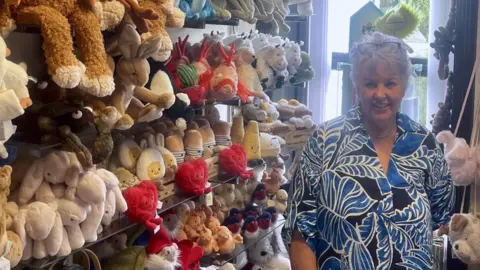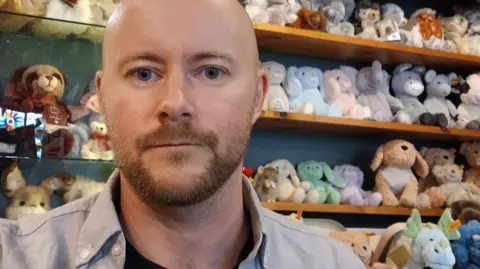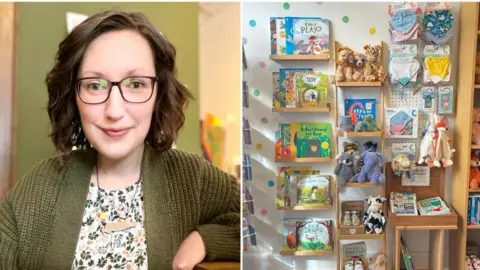Jellycat pulls supply leaving independent shop owners confused
 Alison McCabe
Alison McCabeJellycat plush toys have been lining the walls at Rumours in Whitby for more than two decades.
At times, they've taken up a third of the North Yorkshire gift shop's total shelf space. "They've always been a good seller," said manager Joe Orrell, whose father owns the store.
But last month, Mr Orrell received an email he "couldn't quite believe".
Jellycat, the British soft toy company, told him it would no longer be supplying Rumours. It did not provide a reason.
"We were absolutely gutted," Mr Orrell said. Sales of the brand's toys made up a "significant portion" of the shop's income.
 Joe Orrell
Joe OrrellThe BBC spoke to owners and managers from four independent shops who said they had been hurt and surprised when Jellycat abruptly told them it would stop supplying them.
"Unfortunately we're not able to support every shop that wants to stock our products and, after very careful consideration, we recently reviewed our relationship with some stores," Jellycat said in a statement. It put this figure at 100 stores in the UK.
"We're truly grateful for their historic support and wish them all the best for the future," it said, adding it still supplied about 1,200 independent stores.
Puddleducks, a children's clothing store in Diggle, near Oldham, had been selling Jellycat toys for close to 20 years.
The brand had "really taken off" in popularity over the past year, said owner Alison McCabe, and some weeks she sold hundreds of items. She would be "inundated" with messages from customers asking which items her shop had in stock, she said.
But, after what she described as months of difficulty getting hold of stock, Jellycat contacted her in mid-June telling her it would no longer supply her.
The emails to stockists who were being cut off were sent on 18 June and appear to be identical in content, apart from the name of the shop. The owners and managers were not addressed by name, with the emails instead addressed to a "Jellycat stockist".
"We're sorry to let you know that, after careful consideration, we'll no longer be supplying Jellycat products to Rumours," the email to Mr Orrell, viewed by the BBC, said. This was related to its "brand elevation strategy", it added.
"Please do not place more orders as they will not be fulfilled," the email continued. "Our decision to conclude the business relationship is final and not open to negotiation."
Jellycat did not explain in the emails why it cut the businesses off.
"We can only think that we're not good enough," Mrs McCabe said, adding she did not know if she could make any changes to encourage Jellycat to start supplying her again.
Another group of store owners, who Jellycat says are among the 1,200 still being supplied, were told they would not be what Jellycat called an "official stockist" but their accounts were "unaffected". The BBC understands this means Jellycat would still supply them with stock, where available, but would not given them an Official Jellycat Stockist sticker to display in their shop window.
Included in this group was Erica Stahl, owner of Pippin, a gift shop in Edinburgh. She told the BBC she was "speechless" when she read the email and that she chose to close her account.
Jellycat told the BBC: "We select our stockists carefully so that we know customers will receive a joyful experience in their stores, and so Jellycat characters can be found throughout the country."
Jellycat became a TikTok hit
Shop owners told the BBC Jellycat's toys had always been a stable seller, bought as gifts for newborns or by children saving up pocket money. Then, last summer, the brand boomed in popularity.
The store owners credited this to the toys becoming hugely popular on TikTok and Instagram, with collectors showing off their displays.
Jellycat toys have also been a growing trend among "kidults" - adults with a strong interest in toys and childish ephemera, such as Lego and Sonny Angels dolls.
In recent years, Jellycat has become increasingly focused on the theatricality of presenting its products, with big "immersive" displays at some large department stores.
At Selfridges in London, toys are displayed around a pretend fish and chip van and wrapped up like a take-away by staff.
Jellycat also opened a "diner" in New York City and a "patisserie" in Paris - all in gentle shades of blue, with shelves of neatly arranged toys, which fans began to post about on social media.
The brand said presentation was just one factor it considered when reviewing partnerships with stores. Jellycat also told the BBC it had visited all its independent stores in person.
'Dribs and drabs' of stock
However, with Jellycat's rise in popularity, came changes to the availability of stock, the shop owners said.
Over approximately the last 12 months, since the toys became more of an online trend, Mr Orrell said stock would only arrive in "dribs and drabs" and his shop had had to reduce the size of its Jellycat display. Collectors visiting his store were getting "more and more disappointed" with what was available.
Andrew Kenyon, co-owner of JAK Hanson, a department store near Wigan, said he would wait months for some orders, or they would arrive incomplete. Customers would travel from around the UK to buy Jellycat toys from his store, but he couldn't advise customers on when stock was arriving as he didn't know.
Shop owners and managers said they felt Jellycat was prioritising its relationships with bigger retailers.
"It became nearly impossible to even order any of the bestselling stock," said Miss Stahl.
"Small independents like myself are only allowed to order from a list of random mismatched odds and ends that the big shops clearly didn't want," she said.
 Erica Stahl
Erica StahlCharlotte Stray, of Keydell Nurseries in Hampshire, agreed. Independent stores were "pushed to the back of the queue" for stock, she said.
When Keydell Nurseries got the letter in June saying Jellycat would no longer be supplying it, "we weren't happy, but we'd been disappointed in the last six, eight months over the supply anyway," Mrs Stray said.
"We've been increasing our supply to both types of stores - small independents and national retailers - at the overall same rate," Jellycat told the BBC. "Keeping all our partners well stocked remains a challenge, and we're constantly working behind the scenes to improve how we plan, allocate and deliver stock as fairly and thoughtfully as we can."
The company said independent stores would continue to be "as important in our future as they've been in our past".
'It's left a really sour taste in my mouth'
Mrs Stray said that by cutting off some stockists, Jellycat was "crushing independent stores", who had supported the brand from the start and relied on it for a big portion of their sales.
Customers have said they are not happy about how Jellycat has treated independent stores, with negative comments flooding the brand's recent social media posts. A post by Miss Stahl on her shop's Instagram account about Jellycat telling her she did not qualify as an "official stockist" has nearly 50,000 likes, with many commenters criticising the brand's conduct.
"I think they've really let themselves down," Bex Christensen, 38, a photographer from Nork Yorkshire, told the BBC. She's been collecting Jellycat toys for more than 20 years and "it's always been from independent shops", she said.
Bex also buys the toys for her two children and estimates that, between them, they have about 100 Jellycat toys at home.
"As a purchaser, it's made it really difficult because my kids love it - but it's left a really sour taste in my mouth," she said. "Jellycat grew off independent businesses."
Jellycat told the BBC it was doing more than ever to support the independent stores it works with, and was planning new initiatives and campaigns.
The stores the BBC spoke to said they were going to stock different plush toys instead.
Mr Orrell is optimistic about the future of his business.
"We'll certainly survive," he said. "We've been going a lot longer than Jellycat have. We're not too concerned."
